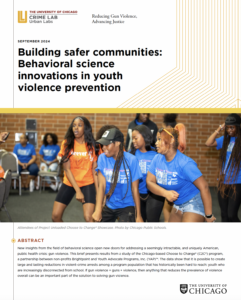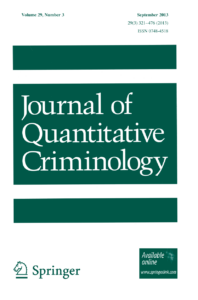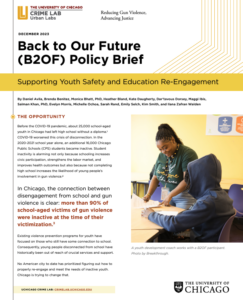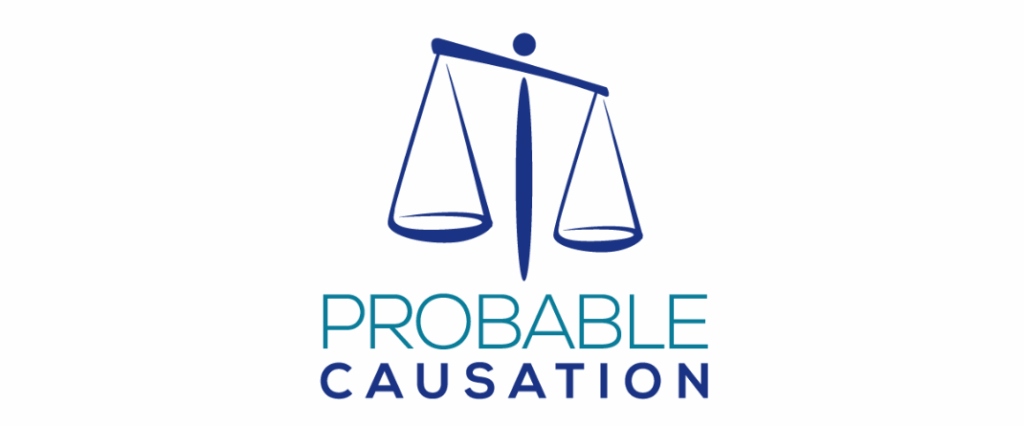Oct 2024
Unpacking the Impacts of a Youth Behavioral Health Intervention: Experimental Evidence from Chicago
This working paper details results from a study of Choose to Change® (C2C®), a trauma-informed cognitive behavioral therapy and intensive mentoring program developed by nonprofits Brightpoint and Youth Advocate Programs, Inc. (YAP).
Abstract
Racial disparities in violence exposure and criminal justice contact are a subject of growing policy and public concern. We conduct a large-scale, randomized controlled trial of a six-month behavioral health intervention combining intensive mentoring and group therapy designed to reduce criminal justice and violence involvement among Black and Latinx youth in Chicago. Over 24 months, youth offered the program experienced an 18 percent reduction in the probability of any arrest and a 23 percent reduction in the probability of a violent-crime arrest. These statistically significant impacts, with smaller magnitudes, continue to persist up to 3 years post randomization. To better understand the behavior change we observe given an arrest is a proxy for criminal behavior, we create a supervised machine learning algorithm from arrest narratives that determines if an arrest was initiated more or less at the discretion of police. We find that the program’s impacts are concentrated in arrests where officers have less discretion in initiating contact, while having little impact on more discretionary contact arrests (e.g. a young person exhibiting “suspicious” behavior). This analysis suggests the effects of the program are being driven by a reduction in youth offending behavior rather than by avoiding police contact.

Building safer communities: Behavioral science innovations in youth violence prevention
This policy brief highlights results from a large-scale randomized controlled trial that evaluated the impact of Choose to Change® (C2C®) on participants’ criminal justice involvement.

Choose to Change® (C2C®) Program Guide
This program guide is intended for community-based organizations working to fill gaps in services and reach an underserved population of youth impacted by violence and trauma.

Improving Programming in Juvenile Detention: The Impact of Project Safe Neighborhoods Youth Outreach Forums
This paper presents the results of a randomized controlled trial of a youth outreach forums program run in the Cook County Juvenile Detention Center (JTDC) by the Northern Illinois Project Safe Neighborhoods Task Force.

B2OF Policy Brief: Supporting Youth Safety and Education Re-Engagement
This policy brief outlines the first year of implementation of Back to Our Future (B2OF), a state-funded, district-led, evidence-informed effort to re-engage disconnected students at an elevated risk for gun violence involvement.
Latest Updates
The best way to cut gun violence, and it’s almost free
In an op-ed for Crain’s Chicago Business, Crime Lab Pritzker Director Jens Ludwig highlights the importance of using data-informed practices to improve public safety and shares key insights from behavioral economics that provide a playbook for addressing gun violence that is both effective and low-cost.

Research on cognitive behavioral therapy for at-risk youth
Dr. Nour Abdul-Razzak joins host Jennifer Doleac on the Probable Causation podcast to discuss the Choose to Change program—an intervention that integrates trauma-informed therapy with comprehensive support to reduce youth violence and improve educational outcomes.

Deaths of decision-making are killing American teens. Schools can fix it.
Crime Lab executive director Katie Hill pens an op-ed for Brookings about how cognitive behavioral programs can teach teens decision-making skills that can dramatically reduce violence and save lives – often at little or no additional cost.

